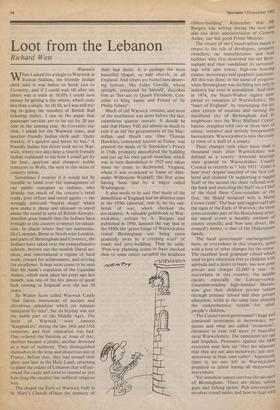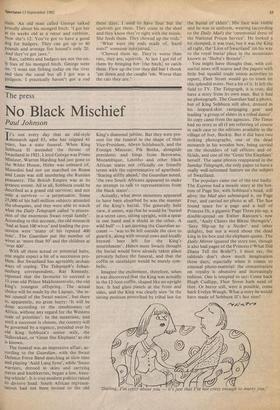Loot from the Lebanon
Richard West
Warwick
When I asked for a single to Warwick at Euston Station, the friendly Indian clerk said it was better to book just to Coventry, and if I could wait till after ten (there was a train at 10.05) I could save money by getting a day return, which costs less than a single. At 10.10, as I was still try- ing to grasp the wonders of British Rail ticketing policy, I saw in the paper that passenger services are to be cut by 20 per cent in the coming year. At Coventry sta- tion, I asked for the Warwick train, and another friendly Indian clerk said: 'Quite frankly, it's quicker and better by bus.' A friendly Indian bus driver took me to War- wick, where two days later a fourth friendly Indian explained to me how I could get by the best, quickest and cheapest public transport to Wells, the next in this series of country towns.
Sometimes I wonder if it would not be feasible to hand over the management of our public transport to Indians, who already run much of the country's retail trade, post offices and travel agents — the wrongly criticised 'bucket shops' which now make it cheap and pleasant to travel about the world in spite of British Airways. Another great benefit that the Indians have brought to this country is respect for educa- tion. In places where they are numerous, like Leicester, Brent in North-west London, and parts of Birmingham and Coventry, the Indians have taken over the comprehensive schools, thrown out the modish liberal no- tions, and reintroduced a regime of hard work, reward for achievement, and striving for excellence. It may soon come to be seen that Idi Amin's expulsion of the Ugandan Asians, which took place ten years ago last month, was one of the few pieces of good luck coming to England over the last 30 years.
Sir Walter Scott called Warwick Castle 'that fairest monument of ancient and chivalrous splendour which yet remains uninjured by time', but its heyday was not the noble part of the Middle Ages. The lords of Warwick were famous 'Kingmakers' during the late 14th and 15th centuries; and their reputation was bad. One ordered the burning of Joan of Arc; another became a pirate; another drowned in a butt of malmsey. They distinguished themselves in the long and disastrous war in France. Before that, they had earned their glory and loot in the Holy Land, returning to plant the cedars of Lebanon that still sur- round the castle and serve to remind us just how long the country has suffered religious war.
The chapel the Earls of Warwick built in St Mary's Church effaces the memory of their bad deeds. It is perhaps the most beautiful chapel, or side church, in all England. And others are buried here deserv- ing honour, like Fulke Greville, whose epitaph, composed by himself, describes him as 'Servant to Queen Elizabeth, Con- celler to King James and Friend of Sir Philip Sidney'.
Much of old Warwick remains, and most of the mutilation was done before the last, calainitous quarter century. It should be said that Henry VIII did almost as much to ruin it as did the governments of the Mac- millan and Heath era. One Thomas Hawkins, commonly known as Fisher, was granted the lands of St Sepulchre's Priory in 1546, promptly demolished the building and put up his own garish mansion, which was in turn demolished in 1925 and taken stone by stone to Richmond, Virginia, where it was re-erected as home of Alex- ander Wilbourne Weddell; the first stone having been laid by a negro called Washington.
It also needs to be said that much of the demolition of England had an abortive start in the 1930s (aborted, that is, by the out- break of war, which checked the developers). A valuable guidebook to War- wickshire, written by A. Burgess and published in 1950, laments the way that in the 1930s the 'green fringe of Warwickshire round Birmingham was being eaten gradually away by a creeping scurf' of roads and jerry-building. Then he adds: 'Post-war planning seems to have checked then to some extent curtailed the insidious ribbon-building'. Remember that Mr Burgess was writing during the wise and alas too short administration of Clement Attlee, our last good Prime Minister.
The return of the Conservatives meant a return to the rule of developers, property swindlers, car manufacturers and road builders who first destroyed the old Birm- ingham and then vandalised its surround: ings with new towns, high-rise housing estates, motorways and spaghetti junctions. All this was done, in the name of progress, when Birmingham was declining not only in industry but even in population. And then in 1974, the Heath-Walker regime com- pleted its ruination of Warwickshire, the `heart of England', by rearranging the an- cient system of counties and turning the moribund city of Birmingham and its neighbours into the West Midland Conur- bation, complete with two or three tiers of otiose, secretive and entirely irresponsible bureaucrats. Warwickshire is now the coun- ty town of a shell of a county.
These changes took place more than a thousand years after Warwickshire was defined as a county. Armorial bearings were granted to Warwickshire County Council as recently as 7 July 1931: 'Cules a bear erect Argent muzzled of the first col- lared and chained Or supporting a ragged Staff of the second the chain reflexed over the back and encircling the Staff on a Chief of the third three Cross-crosslets of the first, the Shield ensigned with a Mural Crown Gold'. The bear and ragged staff are the signs of the Earls of Warwick; the three cross-crosslets part of the Beauchamp arms; the mural crown a heraldic emblem of county councils; and Non sanz droict, the council's motto, is that of the Shakespeare family.
The local government rearrangements have, as everywhere in this country, gone with a host of other changes for the worse. The ,excellent local grammar school which used to give education free to children with aptitude and a desire to learn, has now gone private and charges £2,000 a year. As everywhere in this country, the middle classes, especially the Labour-voting, Guardian-reading high-minded liberals, now give their children private tuition through primary school and then private education, while at the same time praising the comprehensive system for other people's children. The Conservative government's huge and continued investment in motorways, by- passes and what are called 'extensions" threatens to ruin still more of beautiful rural Warwickshire. The opponents are sad and hopeless. Protesters against the M40 extension near here say 'they are adamant that they are not anti-motorway, just ante motorway in their own valley'. Apparently there is no one left in Warwickshire prepared to admit hating all motorways, everywhere.
Yet somehow nature survives the advance of Birmingham. There are shops selling guns and fishing tackle. Pub conversation revolves round moles and how to deal with
them. An old man called George talked proudly about his mongrel bitch: 'I got her at six weeks old as a ratter and rabbiter. Now she's 12. You've got to have a good clog for badgers. They can get up to 40 Pounds and average fox hound's only 20. And they've got jaws.'
Rats, rabbits and badgers are not the on- 1Y foes of his mongrel bitch. George went on: 'I went out fishing today on the river and then the canal but all I got was a gudgeon. I practically haven't got a rod
these days. I used to have four but the squirrels got them. They come in the shed and they know they're right with the missis. She feeds them. They chewed up the rods.'
`What were the rods made of, hazel nuts?' someone interjected.
`Chewed them up. They're worse than rats, they are, squirrels. At last I got rid of them by bringing her [the bitch] to catch them. Flew up the tree they did but I shook 'em down and she caught 'em. Worse than the rats they are.'



































 Previous page
Previous page